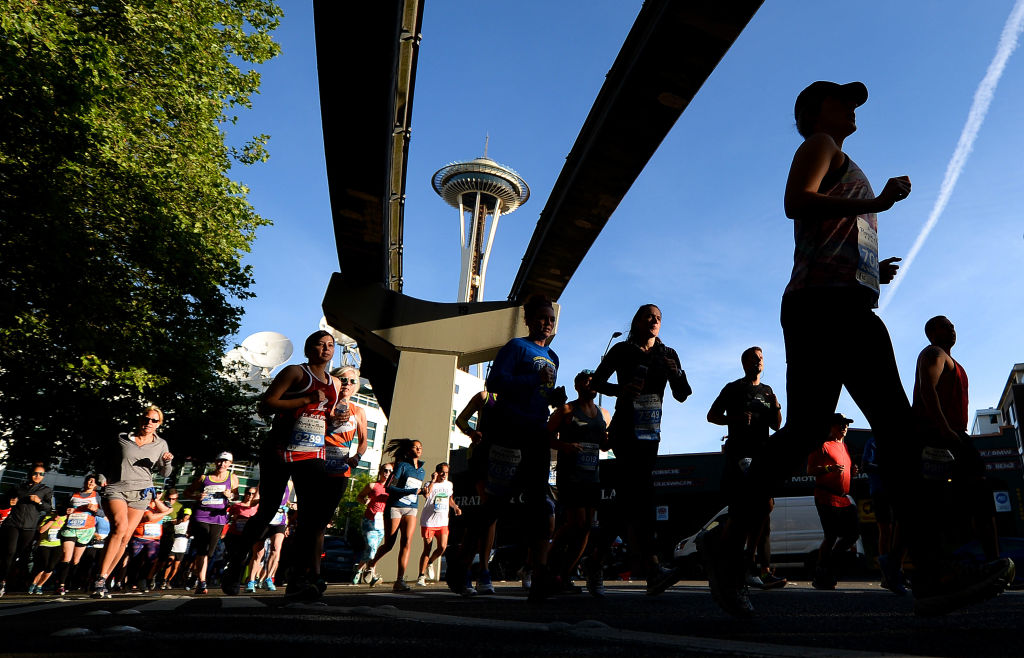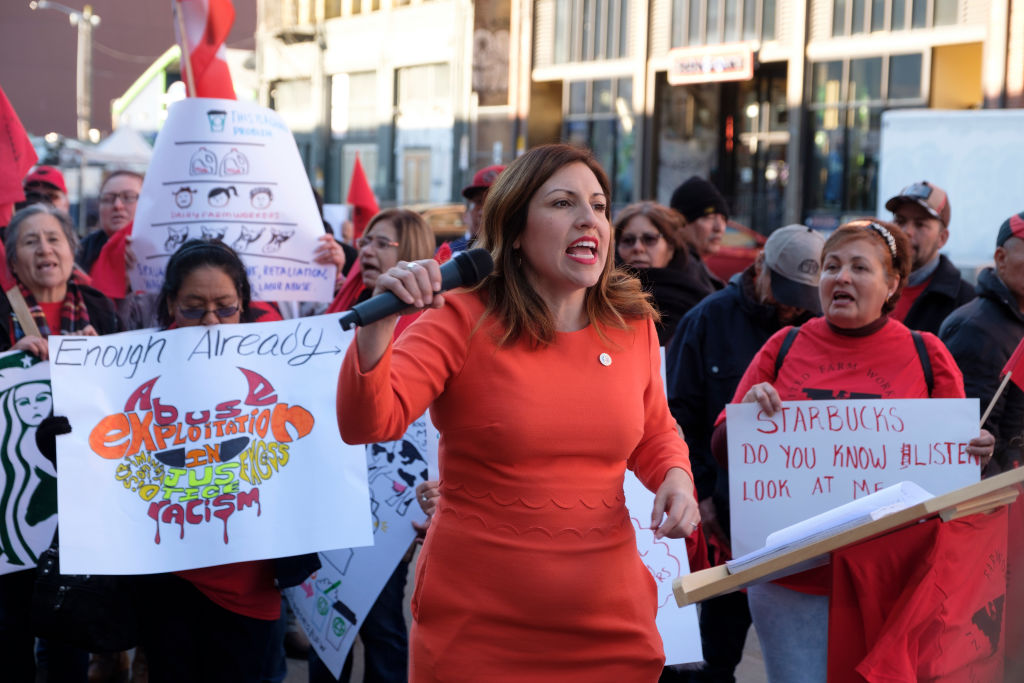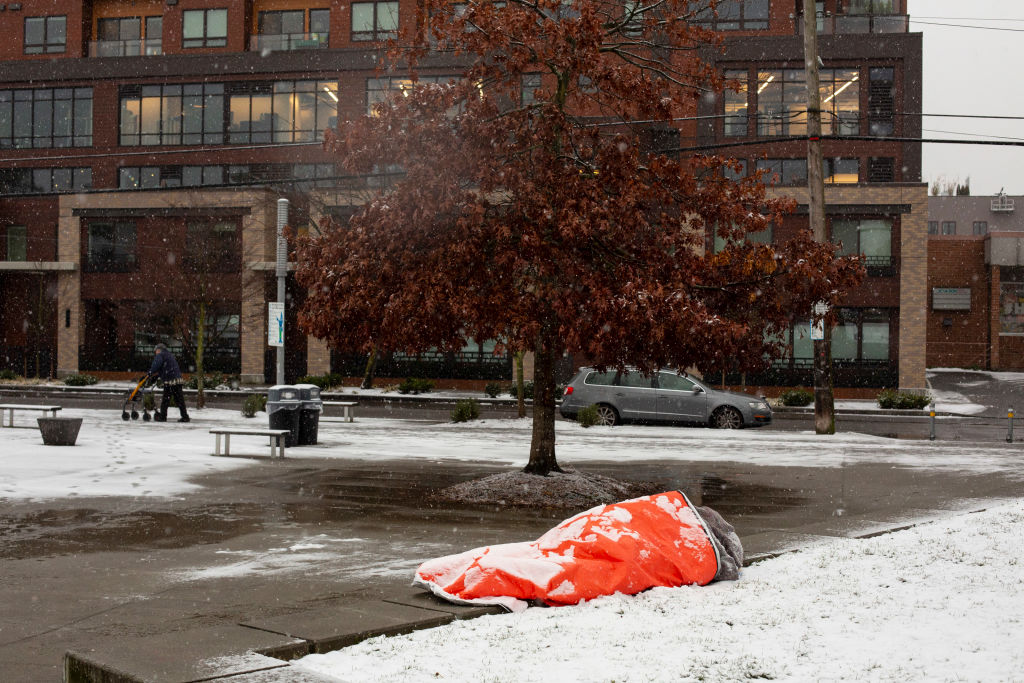
If there’s a left-leaning policy being proposed by a Democratic presidential candidate this election season, odds are it has already been suggested—and probably even tested—in Seattle. Want to tax the rich, like Bernie Sanders advises? Seattle’s city council unanimously passed a bill doing so in 2017 (though it quickly got tied up in court.) Want a $15 minimum wage for all workers, as Elizabeth Warren calls for? Seattle passed that into law five years ago. How about a bill of rights for domestic workers, a measure supported by Kamala Harris? Seattle passed that last year. And while critics of those plans say they put an undue burden on businesses, local officials in Seattle say they’re helping, not hurting, economic growth.
“The interesting role that Seattle has played in the last 10 or so years has been to lead with progressive policy and show that it worked,” says Teresa Mosqueda, a 39-year-old city councilwoman, from her second-floor office in Seattle’s City Hall, which is dwarfed by huge skyscrapers on all sides.
But business leaders in Seattle are pushing back against left-leaning officials like Mosqueda, pouring hundreds of thousands of dollars into attempts to defeat proposals that raise taxes to benefit low-income workers and the homeless. “There’s a basic feeling that [the City Council] isn’t doing a good job, and we don’t want them to take actions that are going to hurt the one thing that is going well in our town—the economy,” says Heather Redman, a venture capitalist and chair of the Washington Technology Industry Association, whose membership includes hundreds of tech companies doing business in the area, including Microsoft and Amazon.
An unprecedented seven of nine seats on Seattle’s city council are up for grabs in November. Local business leaders, especially those in tech, see November’s election as a way to reset the city. “There is really this sense that the council has moved too far to the left, and the Chamber [of Commerce] sees this election as a way to really take control of the council,” says Knute Berger, a columnist for Seattle magazine. National politicians may want to keep an eye on Seattle, one of the most progressive cities in the country, where businesses are trying to convince voters that there is such a thing as too liberal. The city’s upcoming election will be a test of whether Democratic voters are truly willing to stand behind the progressive ideas being talked about nationwide after they’re passed into law.

Seattle’s recent legislative history reads like the ultimate progressive checklist. In 2014, it passed a landmark minimum wage law and created a city office that enforces the law and investigates potential violators. Two years later came a “secure scheduling” law that requires employers to give workers more notice about what hours they’ll be working, and compensate them if their hours change without enough notice. In 2015, Seattle passed a law making it easier for Uber and Lyft drivers to unionize. (The U.S. Chamber of Commerce challenged it in court; the case is ongoing.) In the last month alone, Seattle Mayor Jenny Durkan introduced a bill that would tax ride hailing companies and establish a minimum wage for drivers, the council voted to avoid doing business with any company that leases land in the Arctic National Wildlife Refuge for oil exploration, and council member Kshama Sawant, a member of the Socialist Alternative party, led a march on City Hall to support rent control, which is currently illegal in the state of Washington.
Council members like Mosqueda, who was formerly a lobbyist and campaign manager for the state AFL-CIO, says the city’s progressive policies have helped grow Seattle’s economy. The minimum wage increase put more money in residents’ pockets, which they can spend at local businesses, she says. The Seattle metro area’s 3.1 percent unemployment rate is much lower than the state average of 4.6 percent, and taxable retail sales in Seattle have grown 50 percent over the past five years, according to state data. Last year, Forbes named Seattle the best place in the country for business and careers. Tech in particular has boomed in Seattle — in addition to Amazon and Microsoft, the region is home to SAP Concur, Expedia, Redfin, Tableau, and hundreds of others. “I think part of what has made this economy so good is the fact that we’ve invested in workers,” says Mosqueda.
Try telling that to local business leaders. They say the high minimum wage has forced small businesses to close, that the secure scheduling rule gave them less flexibility, and that a proposed tax on businesses to pay for affordable housing and homelessness services would have driven out companies that power the region’s economy. Dick’s Drive-In, a 65-year-old Seattle restaurant chain, had to raise prices when the minimum wage went up, says Jasmine Donovan, the company’s president. Employees now want to work fewer hours, so it can be hard to find people to fill shifts. “If these regulations were around when our business started, we wouldn’t have made it,” she says. Ari Hoffman, a businessman who lost a race for a city council seat in an August primary, calls the council’s projects “virtue signaling with no practical applications.” “None of them have ever run a business before, and have no practical, common-sense solutions to the city’s problems,” he says.
Seattle’s booming technology sector is becoming particularly vocal about the city’s leftward march — and it’s putting its considerable money behind moving the city back towards the center. “Tech companies are really wading into Seattle politics in a big way, and it’s a role they haven’t played before,” says Dean Nielsen, a Democratic political consultant in Seattle. In July, the Washington Technology Industry Association issued its first-ever endorsements in a City Council race. It backed only one incumbent, saying it was looking for candidates “who will genuinely engage in a productive dialogue with the technology sector.” Amazon gave $400,000 to the Civic Alliance for a Sound Economy (CASE), a PAC sponsored by the Seattle Chamber of Commerce, in 2019, which made similar endorsements. An Amazon spokesperson said the company supports CASE’s endorsements, and that it donated to the organization “because we care about the economic health of Seattle and the region.” Other companies that donated to the Chamber’s PAC this year include Expedia ($50,000), Boeing ($30,000), and Vulcan ($155,000), the company created by the late Microsoft co-founder Paul Allen.
Tensions between the business community and elected officials came to a head last year over one issue in particular: homelessness. In May of 2018, Seattle’s city council passed a $275-per-employee tax on businesses making more than $20 million a year that would have raised money for programs to address the city’s growing homelessness crisis. But the law ran head-first into a brick wall of corporate opposition. Amazon threatened to stop construction on a downtown Seattle office tower over the tax, and gave $25,000 to an initiative created explicitly to oppose the tax and send it to a ballot referendum. The group created to oppose the tax raised tens of thousands of more dollars, and a few weeks later, in an embarrassing reversal, many of the council members who had voted in favor of the tax voted to repeal it. Only two, Mosqueda and Sawant, voted to keep the tax.

As in cities like San Francisco and Los Angeles, Seattle’s homeless population is growing as affordable housing gets harder to find. Rising homelessness has increasingly become a way for politicians to criticize West Coast cities whose progressive policies might otherwise be threatening to them. After President Trump visited San Francisco last month, he said that he wasn’t going to let West Coast cities “destroy themselves” because of rising homelessness, and said the Environmental Protection Agency was going to look into environmental problems created by people living on the streets. “Some of the issues falling on their plates are divisive and intractable and not within the city council’s capacity to solve,” said Berger, the columnist. “Homelessness, for instance, is not something a city council can solve on its own.”
Who voters blame for the homelessness crisis, rather than how they feel about minimum wage hikes or secure scheduling ordinances, will likely determine whether Seattle’s great liberal experiment can continue. With that in mind, businesses are focusing in on the issue as a means to pursue their legislative goals, says Nick Hanauer, a Seattle venture capitalist who was one of Amazon’s earliest investors and who created Civic Ventures, a Seattle public policy think tank. “There is a concerted effort by the business community to weaponize the issue of homelessness — it’s the best way they have found to attack the progressive governance,” he said. “Pay no attention to the fact that anytime anyone suggests that cities need to raise revenues, they kill it.”
Tensions between business leaders and urban elected officials are only likely to rise in coming years across America. Cities are becoming more and more liberal as they become hubs for high-skilled, educated workers, and urban areas become too expensive for anyone else. Around 62 percent of registered voters in urban counties identified as Democrats in 2017, according to the Pew Research Center, up from 55 percent in 1998, while 54 percent of voters in rural counties identify as Republicans, up from 45 percent in 1998.
Seattle isn’t the only city that has embraced progressive policies over the last few years, to the chagrin of many local business leaders. San Francisco launched a universal health care program more than a decade ago, and last year passed a tax on businesses to raise money for a homelessness program. New York City is trying to guarantee universal pre-K to all residents. Chicago has also passed a law giving unprecedented protections to domestic workers.
It will be crucial for progressive officials like Mosqueda to convince voters that they’re simultaneously improving conditions for workers while trying to address problems like homelessness. As politics come to a standstill at a national level, it’s up to cities to prove that the best way forward is the progressive way, she says. For her, that was the lesson from election night in 2016, when she was celebrating the passage of a statewide minimum wage and paid sick leave law on the same day that Donald Trump was elected President. “It became clear that this was the last line of defense,” she said. “We have to stand up for our progressive cities, which are going to be the front line for defending the most vulnerable people in America.”
More Must-Reads from TIME
- Cybersecurity Experts Are Sounding the Alarm on DOGE
- Meet the 2025 Women of the Year
- The Harsh Truth About Disability Inclusion
- Why Do More Young Adults Have Cancer?
- Colman Domingo Leads With Radical Love
- How to Get Better at Doing Things Alone
- Michelle Zauner Stares Down the Darkness
Contact us at letters@time.com